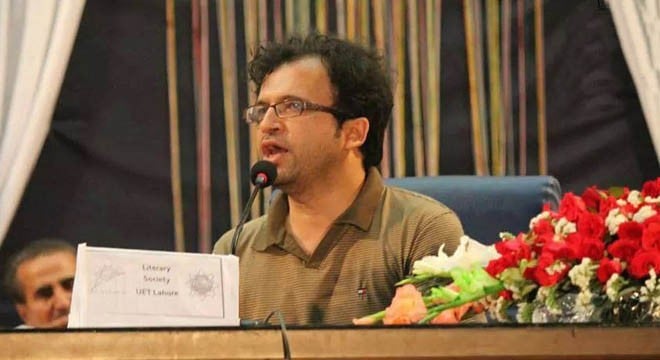

Idris Babur is one of the most creative ghazal poets of the generation that started writing in the decade of 1990s. His ghazals have appeared in top-notch literary journals of the subcontinent. He didn’t care to bring out his verse collection but two years ago his friends selected some of his ghazals and thus his maiden collection Yunhi was born.
An electrical engineer by training, Idris Babur edited the literary magazine of the University of Engineering and Technology while he was studying there. He joined civil service for a short time but quit very soon. Later, he shifted to Norway and has been living there for many years. He is an exceptionally well-read man which is not a very common trait among poets these days.
His next collection of ghazals, Aik Hazar Aik Din, will be published shortly. He has translated selected works of T.S Eliot, Octavio Paz, Wyslawa Szyborska, Derek Walcott, Joseph Brodsky, and a few others into Urdu. Likewise, he is interested in translating Pakistani verse into English and has recently translated selected verse poets like Nasreen Anjum Bhatti, Jawed Anwer, Dr Waheed Ahmad and Ali Akbar Natiq into English.
An out and out bohemian soul, he does not give a damn to publicity as he does what he is best at: composing extraordinary ghazals. TNS caught up with Idris Babur in Lahore recently.
The News on Sunday: Why does ghazal continue to retain the old trappings of classical age? Can ghazal survive in times when nazm is holding sway?
Idris Babur: Well, not everything in the ghazal tradition is obsolete even though some parts of it seem positively horrible. Unfortunately, these are also the parts which are most repeated and enjoyed, thanks to the popularity of oral recitation aka the mushairas. I believe if you have got something to say, your success or failure as an artiste lies in saying it your way. I try to do it in my own way and I don’t care much about the old tradition anyway.
At the same time, modern nazm despite the advances it has made has its own contradictions and set of detractors. With sheer lack of authenticity and excessive doses of alien elements (not to mention cheap slogans and rhetoric), quite a majority of the nazms seem to be coming directly from the anchorpersons lost in faraway galaxies. Postmodern nazm can be fairly be considered as out of place as the neo-classicist ghazal.
TNS: How would you define modern ghazal?
IB: Modern ghazal departures from the classical on all planes. In the beginning, true to its radical spirit, it destroyed more than it built. Modern ghazal has lived with classical ghazal, trying a comeback at the mercy of the neo-classicists. For us, the writers, who belong to or have moved onto the postmodern era, this scenario makes our time and task more interesting.
TNS: Why did you decide to get your first book published so late?
IB: A major part of the poetry included in Yunhi was published upto 1990s. The ghazals that appeared in Funoon and Aasaar were received warmly and there are many poets who got influenced by those ghazals. I was pleasantly surprised when I met poets, both junior and senior, who talked highly about my verse. This was quite astonishing for an unpopular poet like me. You know I wasn’t in Pakistan either, living far away in Oslo. Some of my friends selected a few ghazals of mine and got them published.
Again, my book was lucky as it attracted serious ghazal readers. I don’t care much about projecting myself as I haven’t resorted to these tactics ever in my life. I was pleasantly surprised when I was awarded the Faiz Ahmad Faiz award though I don’t belong to any literary cartel. So had my friends not been around, my book would not have seen the light even till today.
TNS: What is it that makes you a poet?
IB: Well, there are many things which pushed me. First of all, it’s the nature; it could be the nature or my nature. Then there is life which one has to pass through -- the wasteland of time. You despair at achieving so little, so despair moves you. Finally, there is love for which no explanation is needed. Apart from this, there is a joy to go on trying as itstill worth it.
TNS: What are you inspirations?
IB: One can go on mentioning the names of books, writers and movies. I find it superficial. As a matter of fact, whatever happens around me is a source of inspiration. A poet lives in an endless procession of joys and sorrows, gains and losses, both personal and global. Nature as a whole is a poet’s world within -- -it comes to him incomplete with a lot of blank spaces which he fills with poetry.
TNS: Do you attach any importance to critics?
IB: Yes, I do. I read and enjoy them. Lately, I have enjoyed reading some enlightening works of Shamsur Rehman Faruqi and recently by Nasir Abbas Nayyar.
TNS: Are you satisfied with your poetic sojourn?
IB: No, I am not satisfied Yehi sans hai, yehi mera akhri chance hai. I haven’t got ticket for another life.
TNS: What do you plan to do in future?
IB: I am trying to get my second book published. My readers are fed up of reading the photocopies of Yunhi.